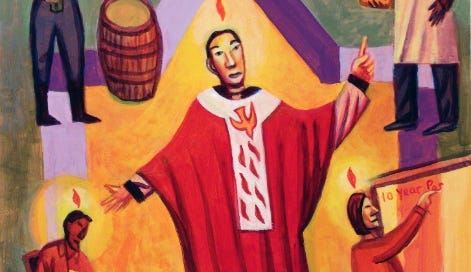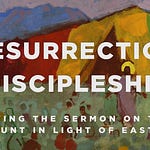Acts 2:1-21
Pentecost
The Holy Spirit appeared like a “violent wind,” like fire breaking across language barriers. In the chaos of Pentecost, the church was born. The Church is Christ’s bride tasked with proclaiming Jesus' present reign and also looking ahead to the day when Jesus’ kingdom will be fully realized.
What happened on Pentecost 2000 years ago left onlookers wondering just what in the world was going on. Was the gathered mass of people drunk at nine o’clock in the morning? How was what was happening, well happening? These are questions we still ask today as we reflect back, remembering the moment Christ’s Church took shape and Peter gave his first sermon.
Matthias had just been installed as an apostle, replacing Judas. While this was occurring, outside of the Upper Room window, pilgrims from all over the Jewish diaspora had converged upon Jerusalem for the Jewish Festival of Pentecost. This was a festival recalling, celebrating and remembering the first Passover, remembering when God gave the Law to Moses. “Jews from every nation were gathered” from far and wide in Jerusalem. From nations like Persia, Mesopotamia, and Cappadocia, along with nations, I will allow someone else to pronounce.
This was a roll call recorded by Luke. People of every tongue and tribe. All were present, cutting across whatever divides had been present or would be present.
Then the Holy Spirit descended, causing a commotion the likes of which well-meaning church folk might frown upon today. At once, everyone began to speak different languages, every known language across the Jewish diaspora, and they understood one another. The crowd started to gripe: Those Christians are doing the same thing they did when Jesus was with them— they’ve been drinking (which, if you’re counting at home, is the first and last time anyone ever accused Christians of being fun).
In our 21st century reading of Pentecost it is not the diverse ethnic gathering of the nations that we miss but rather the historical inclusivity. Tom Long, a teacher of preachers, points out that four of the nations mentioned by Luke would have had to do some serious time traveling - some Dr. Brown Back to the Future-type stuff - to be present. You see, the Medes had been long extinct, for at least 200 years. Luke mentioned the Elamites, but they had not been on the scene since the second chapter of Ezra. Pentecost was a gathering of people from the north, south, east, and west, and at the same time a gather of the living and the dead. A gathering of all people.
With all of the nations - past and present - what happened at Pentecost, the outpouring of the Holy Spirit was for all people.
We were all there.
The gift of the Holy Spirit sent upon the church was a gift for those who spoke Hebrew and Cappadocian and is a for us today who have never studied or heard of the ancient nations recorded by Luke.
Everyone was, is, caught up in the work of the Holy Spirit.
All of our pasts - the parts we celebrate and the parts we want to forget. The events in our lives - the events of our lives we celebrate and the moments we attempt to sweep under the rug.
All people - the ones we will never meet, the ones we lovingly remember, and those we try to forget. The ones who are told they are not welcome and the ones we say are not worthy.
All of us. Every part of us.
And the best part? What happened at Pentecost was nothing new. We in the church often look to Pentecost as the moment when God finally sent the Holy Spirit in the same way Christ was physically sent in the incarnation. The Holy Spirit - the third rail of the Trinity, the person within the Godhead that keeps us on our toes - has been moving and shaping all of creation, dating back to the moment when “a wind from God swept across the face of the waters”[i] and there was light.
The Holy Spirit was present with Moses as he led Israel out of bondage and received tablets with the Ten Commandments etched into them.
The Holy Spirit descended when Jesus preached his first sermon and when he was baptized.
The Holy Spirit overshadowed Mary’s womb.
The Holy Spirit spoke to us, we believe and proclaim in our creeds, through the prophets.
The Holy Spirit has been active since the beginning of creation, but at Pentecost, everyone - breaking through geography and time - was caught up, blessed, remembered, and most of all, redeemed by the Spirit.
The promise of the outpouring of the Holy Spirit at Pentecost breaks every artificial boundary, every self-imposed border, and every pretense of privilege.
The Holy Spirit though, however mighty it may be, is not oppressive, forcing itself upon you, but rather the Holy Spirit, just like Christ, is life-giving. The late Phyllis Tickle wrote that we today are living in the age of the Spirit. The Holy Spirit is moving us within the Church just as it did at Pentecost - breaking across barriers of race, gender, social status, sexuality, and all of the other markers we use to separate the church - and those outside the church in a moment of Holy Revitalization so that Christ’s Lordship may be known throughout creation.
The Holy Spirit still may not act like an anesthesiologist numbing you or us to the suffering of the world. To the contrary, the Spirit of God may just place the suffering of the world front and center in your life, front and center in our lives as a called and gathered community.
On that Pentecost, we were all there. All of us. All of you. And that is how the church was formed and sent - all people, engulfed by God’s amazing grace, not because of their merit but rather because of the faithfulness of the One the church proclaimed then and proclaims today.
At Pentecost, using every language known so that there would be no mistake, no mistranslation, no nuance missed, or nonverbal misconstrued. The Holy Spirit descended so that those present, those in the past returned to dust, and us today might trust, we might believe. So that we will have faith grounded in the hard-to-believe, impossible, and yet all too real promise made by God in Jesus Christ - the perfection demanded in the Law, obedience, and perfection, has been given to you, has been given to everyone, not by what we can do but rather by what has been done. What has been done, accomplished - resurrected and ascended - by Christ.
At Pentecost, the Holy Spirit was once again set loose on creation, setting the church in motion, filling Peter with words to proclaim, setting us loose, and filling us with the cosmic-breaking power of God not so that we would retreat to the Upper Room. No, filled with the power of the Holy Spirit, we, like Peter, point to the One who was present when that “wind from God swept across the face of the waters”[ii] and there was light. Pentecost is proof that God is not silent. God is not content to leave us without a word to proclaim.
Proclaiming the Good News of Christ, the church then and today proclaims - so much so that we may be confused for being drunk at nine o’clock in the morning - that we have been redeemed, we have been saved, regardless of time, location, or merit. The God who created and sustains has redeemed creation and continues to fill us, sending us out to proclaim it again and again.
[i] Genesis 1:3
[ii] Genesis 1:3


















Share this post